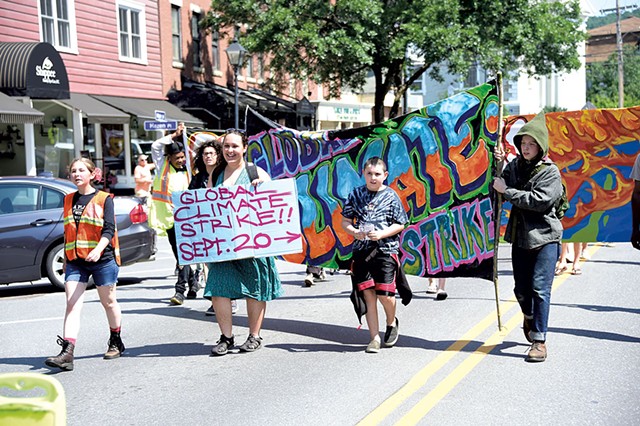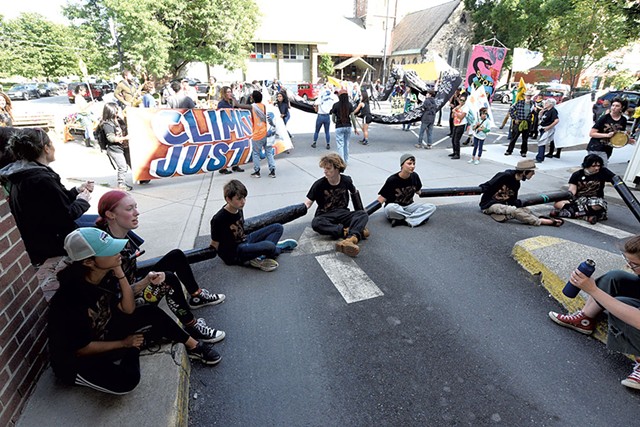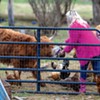click to enlarge 
- Jeb Wallace-Brodeur
- Campers protesting in Montpelier in 2019
It has all the hallmarks of a quintessential New England sleepaway camp: group games, swimming trips, bonfires and sing-alongs. Campers can expect to walk away with deep friendships and maybe a bad sunburn.
But beyond all that, campers attending Uprise! Youth Activism Summer Camp also learn how to make protest banners and engage in nonviolent direct action. Attendees are taught labor rights; even the tree climbing has a political dimension — it can be a useful tactic for evading police during protests. Campers end the summer session by staging a rally, usually in Montpelier, complete with press releases, chants, and calls for action of one sort or another.
Now, though, the 5-year-old Marshfield camp finds itself the subject of unwelcome attention from town zoning officials, who have filed a complaint in state court charging that the camp has been operating without a required permit. Although Uprise! applied for — and received — a permit to operate in 2019, Marshfield's zoning administrator, Kathleen Hayes, said the camp failed to acquire the necessary operational permits after that.
To receive a conditional use permit, the camp would face a hearing process to allow neighbors to voice concerns, and it would pay a fee of $175. Town administrators encouraged Henry Harris, the camp's founder and owner, to apply for a multiyear permit to avoid having to reapply.
But Harris maintains that the camp's activities are protected by the First Amendment and shouldn't require a permit, labeling the town's insistence as "theater of the absurd." (But in something of a stage aside, he acknowledged that "we probably should have just filed our permits.")
Harris, who grew up in the Northeast Kingdom, has plenty of experience sticking it to the Man. He's worked for decades as a volunteer organizer, advocating for food sovereignty and racial and economic justice. The 44-year-old activist makes his living as a carpenter, but organizing has always been his passion.
Harris is one of the founders of A Center for Grassroots Organizing, a Vermont-based incubator for social action. After surveying land in the Hudson Valley, Harris and friends chose Marshfield in 2018 as an ideal location for the center, which they had been dreaming up for years. With their history as a magnet for back-to-the-landers in the 1960s and proximity to unconventional Goddard College, Marshfield's rolling hills proved an apt location for a leftist organization looking to plant roots.
Now, the campus that hosts Uprise! serves as a hub for grassroots efforts, spearheaded by a loose network of committees. The projects include the Regeneration Corps, an educational initiative for high schoolers interested in agriculture; the Northstar Collective, an effort to combat local food insecurity; and Just Construction, a band of volunteers who carry out free construction projects for social justice leaders of color.
And, since 2018, Uprise! Youth Activism Summer Camp has sprung to life most summers with protest-minded purpose.
Harris and a few friends came up with the idea for the camp in 2016 when protesting the transportation of fracked oil in Albany, N.Y. The activists observed that although young people would bear the brunt of the climate crisis, they weren't being included in organizing work often enough.
The camp has grown in popularity since its first year in 2018, when just 15 campers attended. In two years, the number doubled to 30.
Uprise! is free to campers. Families can donate the formal cost of tuition, which is around $450, but there is no obligation to do so.
Counselors, who are often artists and organizers from around the country, get a $200 tip, and "mentors of color" receive an additional $1,000 stipend. Harris said that's to ensure that campers have the chance to work with nonwhite organizers.
"It was an incredible experience," said Thea Gahr, a printmaker from Portland, Ore., who worked at Uprise! in 2021. Although Gahr said there "was a little bit of chaos around working out money stuff," the biggest payoff was the community she gained. "I got paid, but in a different way," she said.
click to enlarge 
- Jeb Wallace-Brodeur
- Campers protesting in 2021
The sleepaway camp runs for eight days, culminating in a protest that is organized, staged and managed by the campers themselves. The young adults need written consent from their parents if they want to take on a "high-risk" role in the planned action but operate otherwise with minimal interference from staffers.
"There was never a feeling of being treated like a little kid," said Sawyer Totten, who started going to the camp when he was 13. One of Totten's favorite memories from camp was when Harris was chased by a cow at a nearby farm ("He's a big ball of love," Totten said of Harris). Totten also fondly recalled staging a demonstration in front of a TD Bank in Montpelier in 2021 as part of a broader protest against the expansion of the controversial Line 3 pipeline in the Midwest.
The protest that day included dance, song and a 30-foot-long snake puppet meant to represent the pipeline. The year before, campers staged a "dig-in" in front of the Vermont Statehouse, planting scores of medicinal plants to protest legislators' lack of action on climate change.
Traditionally, campers gather to compare notes after a protest, then go for a celebratory swim.
Totten's activism — which he said has been largely influenced by his Uprise! experience — has extended to Washington, D.C., where he once joined other demonstrators to block traffic leading to the U.S. Supreme Court in support of LGBTQ rights. He said he was the youngest person there.
"We're teaching them that you can go out, you can break the rules, and be way more humane and ethical than the people who made the rules," Harris said.
It remains to be seen whether his approach proves applicable in the camp's current zoning beef, which heads to court soon. Harris argues that as an accessory business of a state-recognized farm, the camp should be shielded from permitting requirements by Act 143, which expands protections for on-farm activities. But he's also struggling with mounting legal fees. Negotiations with the town went nowhere.
"I believe most people are favorable to what he is doing," said Hayes, the town's zoning administrator. "As far as the town is concerned, this all had to do with the fact that he needed a permit and didn't want to get it. Plain and simple as that."
Last summer, Harris decided not to hold Uprise! at the Center for Grassroots Organizing because of the ongoing dispute with the town. Instead, he hosted an international conference for agriculture educators. He said the ongoing legal situation makes having the camp unlikely this year, though he hopes to hold a smaller youth event.
Harris acknowledges the awkwardness of the camp's legal situation. "Here we are saying, 'Hey, if you can engage your community, if you can get your message heard, if you can speak truth to power and persevere, you can win,'" he explained. "But what's going to happen?"
So far, at least, no one has called for a protest.





















































